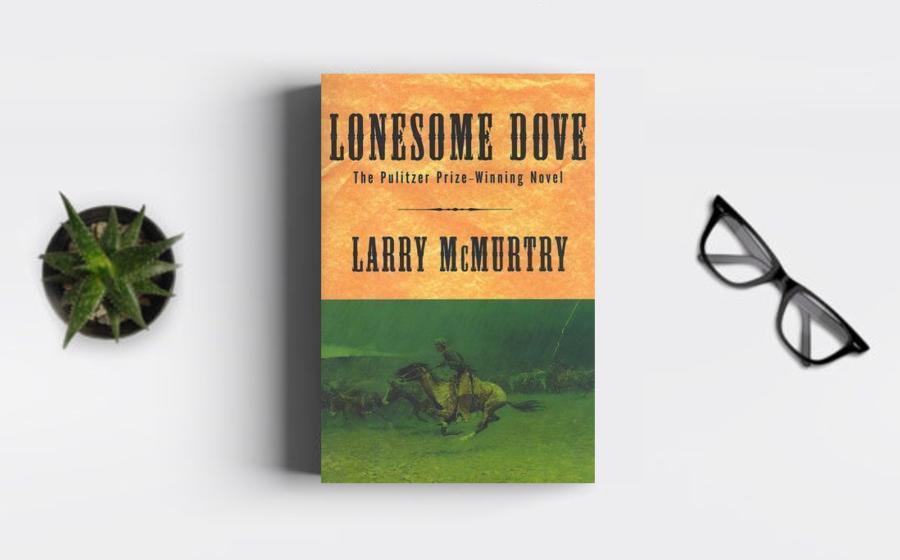"Lonesome Dove" is a Pulitzer Prize-winning novel
written by Larry McMurtry, first published in 1985. This
epic Western saga is set in the late 19th century and
follows the journey of two retired Texas Rangers,
Woodrow F. Call and Augustus "Gus" McCrae, as they
embark on a perilous cattle drive from the desolate
border town of Lonesome Dove to the unexplored lands of
Montana. The novel spans a vast and unforgiving
landscape, offering readers a rich tapestry of
characters, relationships, and the harsh realities of
the American West.
At its core, "Lonesome Dove"
explores themes of friendship, loyalty, love, and the
inexorable march of time. The narrative is driven by the
characters' personal journeys, reflecting the
complexities of human nature against the backdrop of a
rapidly changing frontier. McMurtry skillfully weaves
together a compelling narrative that captures the spirit
of the Old West while addressing timeless and universal
aspects of the human condition.
One of the standout
features of "Lonesome Dove" is its vivid and
multifaceted characters. McMurtry crafts a diverse cast,
each with their own quirks, flaws, and strengths.
Woodrow Call, the stoic and duty-bound leader, and Gus
McCrae, the charismatic and easygoing companion, form
the heart of the story. Their friendship is at the core
of the narrative, offering a poignant exploration of
camaraderie and the passage of time.
Other
characters, such as the complex and troubled Jake Spoon,
the resilient Lorena Wood, and the enigmatic Blue Duck,
add layers to the narrative. McMurtry's ability to
breathe life into these characters, giving them depth
and nuance, allows readers to form strong connections
and invest emotionally in their fates.
"Lonesome Dove" stands out
for its authentic depiction of the American West during
the late 1800s. McMurtry captures the harsh and
unforgiving nature of the frontier, portraying the
challenges faced by pioneers, ranchers, and lawmen. The
novel explores the impact of cultural clashes, the
pursuit of dreams, and the consequences of a rapidly
changing landscape.
The meticulous research and
attention to detail contribute to the novel's
authenticity, immersing readers in a world where
survival depends on resilience, adaptability, and the
ability to confront one's inner demons. The Old West
comes alive through McMurtry's prose, making "Lonesome
Dove" a powerful and evocative journey into a bygone
era.
"Lonesome Dove" is renowned for its epic scope and
narrative ambition. The novel spans a vast geographical
distance, taking readers on a journey from the dusty
streets of Lonesome Dove through the perilous trails of
the frontier to the uncharted territories of Montana.
The cattle drive becomes a metaphorical odyssey, testing
the characters physically, emotionally, and morally.
The expansive storyline allows McMurtry to explore
various themes and subplots, from love and loss to the
clash between civilization and the untamed wilderness.
The novel's ambitious narrative structure contributes to
its timeless appeal, offering readers a sweeping and
immersive experience that transcends the boundaries of
the Western genre.
While "Lonesome Dove" is set in a specific historical
period, its exploration of timeless themes resonates
with readers across generations. The novel delves into
the complexities of human relationships, the passage of
time, and the inevitability of change. The characters,
despite their rugged cowboy exteriors, grapple with
universal emotions and dilemmas, making them relatable
and compelling.
Friendship, loyalty, love, and
the pursuit of meaning are central themes that elevate
"Lonesome Dove" beyond a simple Western tale. McMurtry's
exploration of the human condition, framed within the
harsh realities of the frontier, gives the novel a depth
and resonance that goes beyond its genre classification.
The critical acclaim
and accolades bestowed upon "Lonesome Dove" contribute
to its status as one of the top American classics. The
novel received the Pulitzer Prize for Fiction in 1986, a
testament to its literary merit and contribution to
American literature. The Pulitzer committee recognized
McMurtry's achievement in crafting a work that
transcends genre conventions, offering a nuanced and
powerful exploration of the American West.
In
addition to the Pulitzer Prize, "Lonesome Dove" was
adapted into a highly successful television miniseries,
further solidifying its cultural impact. The adaptation,
featuring an ensemble cast led by Tommy Lee Jones and
Robert Duvall, introduced the story to a broader
audience and garnered widespread acclaim.
Beyond its critical acclaim and
literary recognition, "Lonesome Dove" has left an
indelible mark on popular culture. The novel's
characters, quotes, and iconic moments have become
ingrained in the collective consciousness. The enduring
popularity of the work is evident in its continued
relevance, with readers returning to its pages and new
generations discovering its timeless appeal.
The
legacy of "Lonesome Dove" extends beyond the literary
realm, influencing subsequent Western literature, films,
and television series. McMurtry's work has inspired a
renewed interest in the genre and a reevaluation of its
potential for exploring complex themes and character
dynamics.
"Lonesome Dove" earns its place as one of the top American classics due to its rich characterization, authentic portrayal of the Old West, epic scope, exploration of timeless themes, award-winning recognition, and lasting cultural impact. Larry McMurtry's magnum opus continues to captivate readers with its immersive storytelling, leaving an enduring legacy in the canon of American literature.






